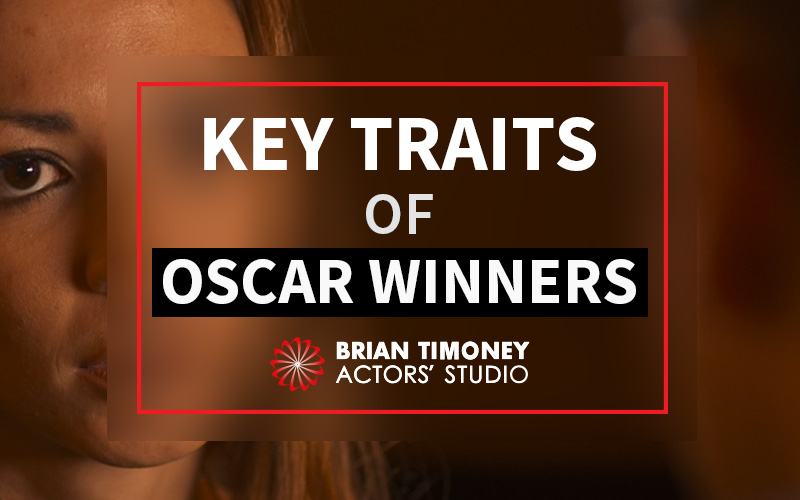“Acting is not about being someone different. It’s finding the similarity in what is apparently different, then finding myself in there.” – Meryl Streep
For aspiring film actors, winning an Academy Award (more commonly known as an ‘Oscar’) is the ultimate accolade. It shows that you are capable of performing at a level few other actors are able to achieve and is the ultimate seal of approval from the film industry. But what makes an Oscar-winning actor? What skills do they have in common that makes them first among their peers? Well, for many of them, it comes down to their familiarity with ‘The Method’.
Over 80% of Best Actor Academy Awards this century have been won by method actors who use The Method to take their performance skills to a level beyond what most non-method actors can achieve. There are many aspects to mastering The Method, but there are several key characteristics that we see time and time again in Oscar-winning method actors that are well worth emulating on your road to success.
Over 80% of Best Actor Academy Awards this century have been won by method actors
Dedication to character
Method actors will often go to great lengths to create an authentic performance. In preparation for his Oscar-nominated leading role in Taxi Driver, Robert De Niro actually worked as a cab driver, reportedly putting in 12-hour shifts driving fares around New York City to get into character.
Another common technique is to look to the animal kingdom for inspiration. Many followers of The Method base their physical approach to a role on different animals to give their characters unique and arresting ways of moving. For Taxi Driver De Niro based his performance on a crab as he felt his character was indirect and tended to shift from side to side. As Stanley in A Streetcar Named Desire, Marlon Brando imitated an ape, while Dustin Hoffman referenced a weasel in Midnight Cowboy. Method Acting training includes specific classes focusing on animal work to help actors master this important dramatic tool.
Using genuine emotions
Affective memory is a technique method actors learn, which allows them to tap into their own memories to create real emotional responses during a performance. This is achieved by working out the emotion they need to portray and then using experiences in their own life that triggered similar feelings in order to produce a genuine emotional response that recreates those feelings.
To do this, actors need to really know themselves, their own psyche, and how to explore this for dramatic effect. Learning to be a method actor involves learning to better know yourself and your own emotions and how to use your life experiences to create truly raw, engaging performances.
Tapping into their own life experiences
Of course, most actors will be called upon to act in scenes that have no direct analogue in their own lives. The trick is to understand how to successfully relate the emotions you need to convey with a relevant experience in your own life, even if the connection is not immediately obvious.
When filming the famous Russian Roulette scene for the film Deer Hunter, Christopher Walken said he was recalling being sent to summer camp by his parents, which he hated. He was able to use those feelings of being betrayed, ostracised, and alone to inform his performance in a totally different scenario because it required the same feelings from his character.
Strong self-discipline
All of this focus on emotions might make it sound like method actors are likely to be volatile or in danger of going out of control at the drop of a curtain. In fact, successful method acting requires serious self-discipline. Learning The Method involves a great deal of time, effort and concentration in order to be able to call up the right emotions at the right moment. Through this learning process, method actors become truly in control of themselves and their emotions in a way most regular actors will never achieve, giving them an advantage both as performers and in their overall work ethic.
Willingness to sacrifice their ego
Actors can have a reputation for being egotistical, but the truly great performers don’t worry about how they are perceived, only about the best way to play their characters with absolute truth. To lose yourself in a character like this, you have to be willing to put aside your own ego, no longer thinking about yourself and your self-image, but focusing purely on becoming your character.
Robert De Niro offers another great example here, with the extreme physical transformation he underwent for his role in Martin Scorsese’s Cape Fear. De Niro completely changed his appearance, including building an impressively muscular physique, covering himself in tattoos and even having a dentist grind down his teeth. This level of dedication to really becoming his character resulted in an incredible performance that shows just what a dedicated method actor can achieve with the right training and attitude.
Are you ready to unlock your hidden acting potential? Register your interest in one of our industry-leading method acting classes today and find out how to make your ambitions of a rewarding professional acting career a reality. We are always happy to hear from prospective students, so if you have any questions, please don’t hesitate to get in touch.


